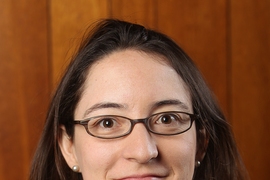The National Science Foundation (NSF) announced last month that Carolina Osorio, an assistant professor of civil and environmental engineering, will receive a 2014 Early Career Award for her project, “Simulation-Based Optimization Techniques for Urban Transportation Problems.” The Early Career Award is NSF’s most prestigious award for young researchers.
Osorio’s work in operations research focuses on developing techniques to inform the design and operations of transportation systems in ways that will mitigate the economic, energy, environmental and human-health impacts of urban congestion; improve the reliability and robustness of transportation systems; and enhance traveler experience in cities.
She uses techniques that combine ideas from the fields of probability theory, simulation, simulation-based optimization, derivative-free optimization, nonlinear optimization, statistics, traffic control, and traffic flow theory.
With the NSF award, Osorio will continue developing simulation-based optimization algorithms that address challenging traffic-management problems in congested urban areas around the world, including Manhattan, Singapore, and Lausanne, Switzerland.
In a recent simulation case study based in Lausanne, Osorio optimized traffic signals in the city center to achieve a 34 percent reduction in commuters’ average travel time during rush hour. She accomplished this by designing an optimization framework that uses information from several traffic simulation models to combine the accuracy of high-resolution models with the computational efficiency of less detailed models. Osorio is currently extending that study to cover the primary traffic signals throughout Lausanne.
Osorio’s ongoing work in the field of transportation simulation-based optimization also includes studies of vehicle-sharing network design, emissions and energy-efficient traffic management, real-time traffic control, and model calibration problems.







